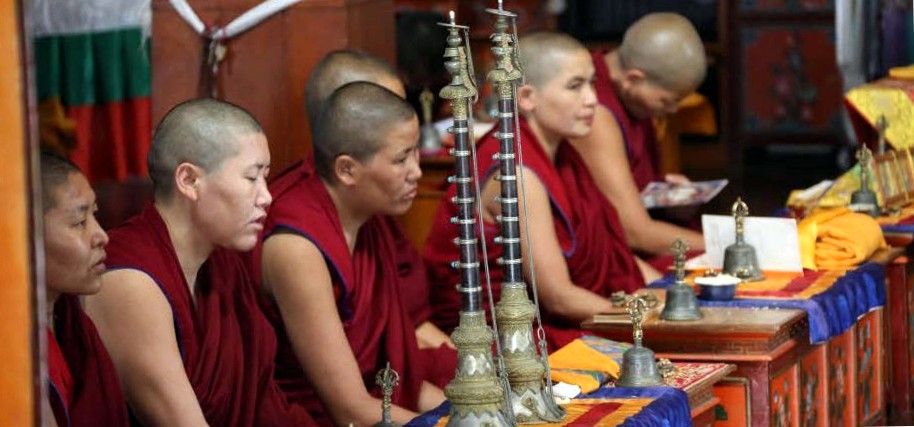A press photographer on a buddha trip – part 1

A330/F 39 – what to do according to the coordinates for "sinking ships sounds, describes at the moment my very personal battlefield. It is just about 35 by 35 cm big. The opponents: flat seat versus sab muscles. And already after two hours the pain in my thighs shows me that I will lose the fight. I am sitting in seat F in row 39 of the airbus 330 to abu dhabi and yes: i hate flying. Not because I was afraid of crashing. But at 1.90 meters tall, it's not really fun to be crammed into an economy class seat for eleven hours. There's occupational therapy wrapped in aluminum in the form of noodles. But this brings neither increased nutritional value nor the desired distraction.
According to confucius, the "way is the goal". My destination is kathmandu, abu dhabi is only a short stopover. I am on my way to nepal. Sitting next to me is wolfgang grader. The bamberger grunen councillor will devote the next two weeks to his duties as national chairman of the tibet initiative and i will accompany him to document his work on the ground in nepal and india photographically.
Flight to india and nepal
Nepal and india became exile for tibetan refugees because of their geographical proximity to tibet. In 1959, the 14. Dalai lama, the spiritual leader of the tibetans, from his homeland to india, where he has since been living in dharamsala. 130.000 countrymen follow him on this way until today, 15.000 more live in nepal. But the situation for exiled tibetans in nepal is not easy: the chinese authorities are putting pressure on the nepalese government. And nepal bends. Nepal has not taken in any more refugees since 1990, and new arrivals are being sent to india. Tibetans born in nepal do not get an identification card with which they can prove their identity. Driver's license and job market remain denied with it.
The tibetinitiative, which grader has led as national chairman since 2000, sees itself as a mouthpiece for tibet in order to draw attention to the grievances that have prevailed in tibet since the chinese occupation in 1950/51. "I wanted to experience the emotional world of the tibetans in exile" so grader. Therefore, every year he travels to india and nepal. To maintain contacts and learn about the current situation of tibetans in exile.
Gay-boy reception
Kathmandu buries us with 31 degrees, 55 percent humidity and a "namaste". That's the usual greeting, spoken with the palms of your hands pressed together in front of your chest. At the airport we are picked up by tobden lama. Graders, the contact person, takes us to a guesthouse in thamel, a district of kathmandu. There tobden and wolfgang discuss the appointments for the next day. I don't know what to expect in the next few days and what people I will meet.
In the evening we meet elisabeth, a good friend of grader's. Her story shows the explosive nature of the situation in tibet: she wanted to enter tibet two days ago, but her visa was not approved. Single travelers were not allowed to enter tibet. Only groups can visit the country, and a government-appointed security guard must accompany the group around the clock.
Via potholes into the monastery
After a gay night we rumble the next morning in an old cab through the streets of kathmandu. The streets are littered with potholes, which is especially jubilant for camera technology and spinal disks. Our destination is the buddhist nunnery of kopan. The nuns were happy about grader's visit and buried us with masala tea. Wolfgang helped the tibetinitiative to organize a series of concerts in germany for the gifted nuns. Traditional tibetan chants were on the program.
"We have to use events like this to show the western world that this culture is absolutely worth preserving" so grader. But the chinese government tries to nip any emergence of tibetan identity in the bud. Only if pressure is exerted from the west on the chinese rulers, there is a chance to save this culture from extinction. At a puja, a traditional "fair" we have the pleasure of listening to the nuns for a while. A moving and spiritual moment.
When we return to thamel for dinner, we are served another surprise for dessert: we are asked to leave the restaurant because an exit ban has just been imposed. The nepalese people demanded a constitution from the government by midnight. But the parties could not reach an agreement. For fear of riots, the government has declared a state of emergency and imposed a curfew. Tomorrow a general strike and demonstrations are expected from the people. Then it is possible that nothing will happen…
To be continued.